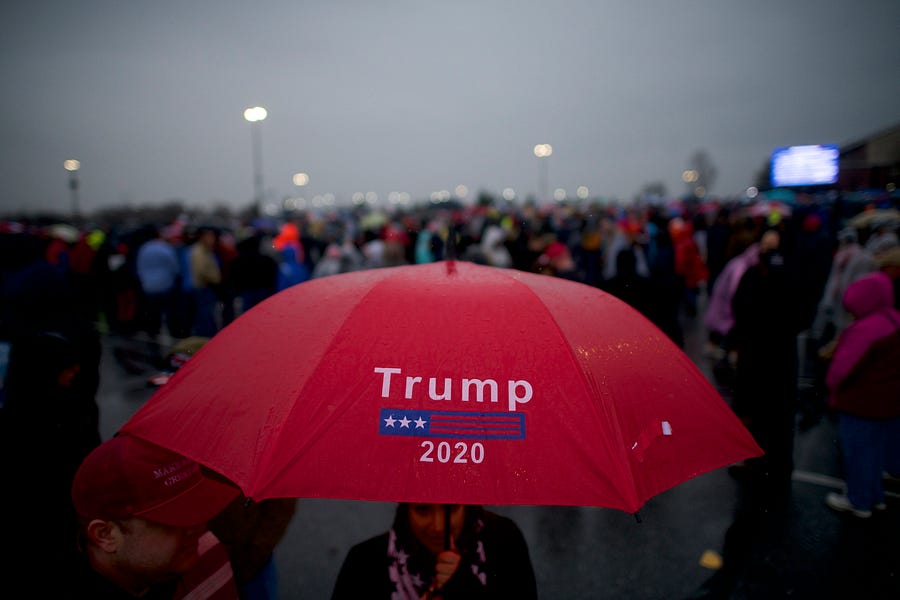As Joe Biden’s lead in the polls continues to expand both nationally and in battleground states, a new explanation for his surge is taking hold, especially among President Trump’s staunchest supporters. The theory holds that there is a large reserve army of secret Trump voters who are afraid, in this time of cancel culture, to state their preference, and that’s why the polls are so lopsided.
The theory is partly a hangover from 2016. It’s true that pollsters undercounted Trump voters in that election. But it’s a huge jump to think it was because SMAGA (Secret Make America Great Again) voters were refusing to state their preference. A postmortem by the polling industry went looking for significant numbers of SMAGAs and came up empty.
If people were afraid to tell the truth to pollsters, there should have been a gap between results from polls conducted by humans and machines. There wasn’t.
“Interviewer-administered polls did not underestimate Trump’s support more than self-administered [automated] and online surveys,” according to the Pew Research Center. Pew even tested the theory by dividing interviews between live interviewers and automated ones, finding “no significant difference by mode of interview on any of four questions asking directly about Trump.”
There were real polling failures in 2016, particularly at the state level, but the polls weren’t that wrong. An average of the final national polls indicated a Hillary Clinton victory margin of 3.3 percent. She won the popular vote by 2.1 percent—well within the margin of error. Pollsters called 47 out of 50 states correctly, and they weren’t that far off in the ones they got wrong. Remember, Trump won thanks to 80,000 votes in three states.
Perhaps the biggest mistakes pollsters made—or at least the ones most responsible for failing to predict Trump’s narrow Electoral College win—were undercounting less-educated voters and failing to catch a late shift among undecideds toward Trump (that shift no doubt fueled in part by FBI Director James Comey’s “October surprise” press conference on Clinton’s handling of classified information). In key battleground states, late deciders went heavily for Trump.
Sure, some undecideds could be considered “secret” voters, but only if they were lying about being undecided, and there’s little evidence of that. Moreover, common sense suggests that social desirability bias—the driver for secret or “shy” voting theories—would be strongest in blue states, where Trump will lose no matter what.
Many of the anecdotes about secret voters come from Republicans who live in places like New York and California. In states where the race is close—the only states that really matter in this election—close to half the voters support Trump, so why would anyone be afraid to say they’re voting for him?
Worse for the SMAGA thesis: There are a lot fewer undecided voters in 2020 than there were in 2016, and undecided voters typically break against the incumbent. In 2016, one driver of high levels of voter indecision was that both candidates were intensely disliked. Those voters broke decisively for Trump. Right now, Biden leads heavily among voters who dislike both candidates.
So why the sudden re-emergence of the SMAGA talking point? The most obvious answer is fear. Biden supporters are terrified we’ll see 2016 all over again. And with increasingly grim polling news, the Trump campaign doesn’t have much of an alternative to declaring the polls fake and betting it all on the turnout of a silent majority.
Some peddlers of the silent-Trumper theory cite a recent survey from the Cato Institute, a libertarian think tank, which found that 62 percent of Americans “say the political climate these days prevents them from saying things they believe because others might find them offensive.” Conservatives and centrist liberals—the theoretical feedstock of the SMAGA reserve army—were the most likely to say they self-censor.
It’s a disturbing finding, but it’s a heavy lift to infer direct relevance for polling, unless you want to believe the president is actually doing well. And there’s no shortage of those who do.
When asked on Fox and Friends if the Cato poll supports the secret-Trump-voter thesis, House Minority Leader Kevin McCarthy didn’t hesitate: “When I look at the underlying polls, I know there is a silent majority out there that believes in the cornerstone and the foundation of security and safety. … And I know those people are going to support the Trump administration, because he’s willing to stand up for you, the American public, and not afraid to tell you his beliefs.”
Maybe McCarthy is right. Or maybe, for the president and his allies, believing in a mythical league of frightened Trumpers is better than facing reality.
Photograph by Mark Makela/Getty Images.









Please note that we at The Dispatch hold ourselves, our work, and our commenters to a higher standard than other places on the internet. We welcome comments that foster genuine debate or discussion—including comments critical of us or our work—but responses that include ad hominem attacks on fellow Dispatch members or are intended to stoke fear and anger may be moderated.
You are currently using a limited time guest pass and do not have access to commenting. Consider subscribing to join the conversation.
With your membership, you only have the ability to comment on The Morning Dispatch articles. Consider upgrading to join the conversation everywhere.